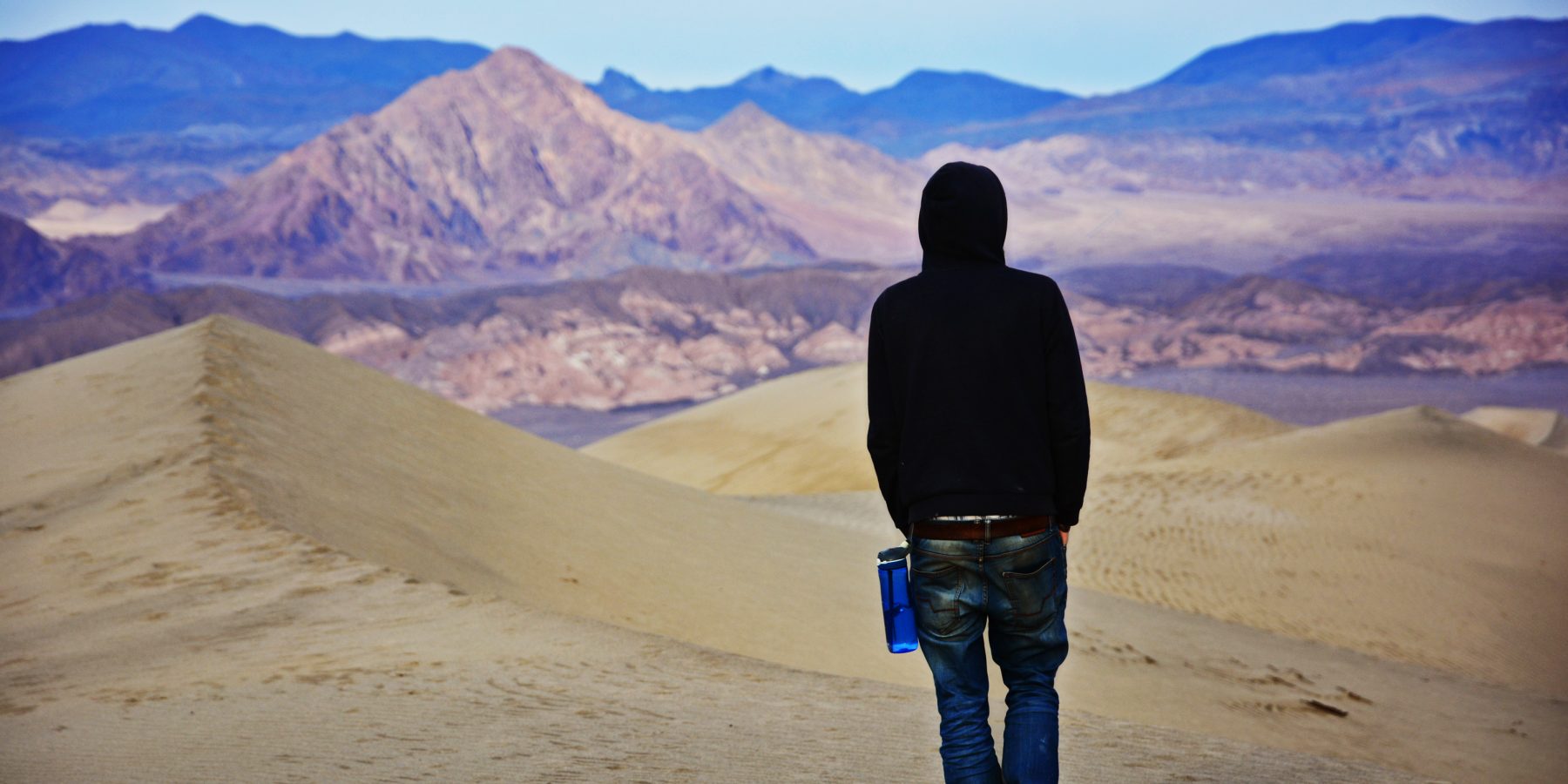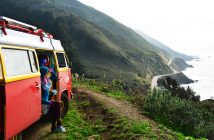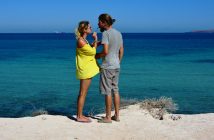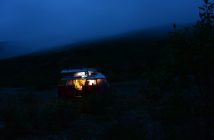Nature is everywhere, surrounding us, affecting us, all the time. Living in our Bus, we can’t escape it’s incessant, magnificent pull. It is both a gift and a curse living in such close proximity to nature – but a gift it truly is.
A lifestyle like this offers us is a much deeper connection to nature than we’ve ever had before in our daily lives. We are out in nature all the time, camping almost every single night. We have crossed a number of different landscapes, each with their own positives and negatives. We get to feel the power of nature, up close and personal, again and again.
We spend a lot of time outside

Necessary pit stop in Southern California
We camp a lot. Most days (in the United States) we drive out into the wilderness, a National Forest or a free camp spot somewhere off of the highway. Often, these places are remote, with no cell service, and nobody around for miles. We love camping like this, where nobody will bother us and we won’t bother anybody. It is peaceful.
And we are surrounded by nature. Sometimes, it’s a forest so thick with trees you can barely see the sky. Sometimes, it’s a foggy mountain pass, where the road is unclear even 20 meters away. Or maybe a field of tall, high grasses, where you can see towering mountains in the background. Or on the middle of a desert plain, surrounded by small bushes and trees and thick, gravely sand. Often, if we stop speaking and just listen for a bit, all you can hear is natural noises, like birds chirping or frogs burping. And sometimes, all you can hear is pure, complete silence.

Salmon Glacier (near Hyder, Alaska)
But nature can be brutal
Being in the middle of nature a lot is not always a positive thing. There are parts of nature that can weigh heavy on us, our lifestyle, and Big Emma. We spent, for example, about two months in the Pacific North West, in the rainforests and on the coasts of Washington and Oregon. It had been almost constantly wet for us for the whole period. Sometimes drizzels, sometimes pouring in heaps, sometimes we will get back to the Bus soaking wet. The Bus was full of condensation in the mornings (and I mean full, it was even on our wood furniture), which is a major problem in the long run, as moisture leads to mold. And we have nowhere to dry things well inside the Bus. Socks and little things, those are okay. But our dish towels just won’t dry, and it’s almost better not to take a shower so I don’t have to live with wet towels in our Bus for days.

The inside of our sliding door covered in condensation in the morning (Olympic National Park, Washington)
Our floor, for example, has four layers to it: foam, carpet (very useless), thin plywoody cardboard stuff, and the metal of the Bus. These have been wet for months, with no sunny days and no opportunity to set them outside the Bus to dry. When we got to LA and it was finally reliably sunny, we laid everything out in a friend’s driveway for a few hours of good, dehydrating sunshine. Our carpet left a wet mark on the concrete of his driveway. You get the idea of how drenching everything has been for us.
To top that off, weather like this makes our power situation bad. The fact that we have solar panels makes us entirely self-sufficient energy-wise. Which is awesome. They make enough power to run our refrigerator and any electrical devices like laptops and camera batteries that we may need. Except when it is raining for days at a time. Or we are so far north in the world that the angle of the sun doesn’t effectively charge them. There have been days, for example, where we have lit candles in our Bus so we don’t have to turn on our LED lights to conserve power, because we have been at very close to empty for weeks on end.
And often, nature is simply gorgeous
Days like these in climates like the Pacific North West are not very fun, but they are not the only things our relationship to nature has to offer us. We get to feel the power of a storm, what it is like to feel the wind blow something as heavy as our Bus and water rattle against our top. We can step outside and see a clear night sparkling with stars, or the awe-inspiring aurora. We have the privilege of witnessing the mind-boggling phenomena of a glacier close-up. I climb mountains with my own legs, and get rewarded with spectacular views of sights I could never describe well enough. I get to look up at the towering redwoods. We feel – better than ever – the gracious power of the sun. I get to see dolphins, and huge sea lions, and whales swim in the ocean. Tonight, we heard a pack of coyotes howling right outside our Bus. These things are beautiful, and reminds us of how amazing all of this nature is. It makes you forget about the fact that our engine runs the risk of overheating in the wide, desert sun.

Ice cave in Mendenhall Glacier (Juneau, Alaska)
It is always a give-and-take. We spent so much time in Oregon and Washington, almost a third of trip so far, because we also thought it was beautiful. Sure, it is really rainy, but the rainforests are gorgeous, and it is a state so filled with National Forests (National Forest means great free camping for us) that we can often choose which one we want. The misty, rocky coastline of the Pacific North West has something magical about it, that make you want to stare at it for hours. But then it starts to rain heavier, and it is time to get back to Big Emma. But every climate is like that, with the things we love about it, and the things that are very annoying.

Whales near Juneau, Alaska. Photo by Carolin Gesch.
The give-and-take: every climate is annoying, every climate is beautiful
In Alaska, we were in places with thick, wild forests and mountain tundra. We have seen the rainforests of Washington and the high deserts of Oregon. The misty coastline of Northern California, and the sunny mountains of the Central and Southern California coasts. In Oregon, there were places we failed to visit all together, because we didn’t want to fight our Bus through the snow and live in freezing temperatures.

View over Eklutna Lake (Alaska). Photo by Konstantin Teyang.
Now, we are in the deserts of Southern California, near Joshua Tree National Park. Here, the air is dry (and so is our floor, and towels, and everything else), and the day is warm in the sun. The ground has rocky, grainy sand and no shade. But it is not that warm, and at night it can easily get down to freezing. My lips are cracking, and everything smells a little dusty. But our solar panels have charged our battery to 94%, and I can plug my laptop in.
We have so many more climates to wander through. We will head back up through California and it will probably get very cold, which means we won’t want to spend time outside and may avoid some amazing places altogether. We will see incredible wildlife in the intense rainforest of the Amazon, but our curtains will surely be moldy from moisture by then. We will spend weeks on sunny, energizing beaches in Mexico that will be horrible for Big Emma because the salt in the air will quickly lead to rust. It is a love-hate relationship to nature. But we don’t need to be strong believers in positivity to see that love always trumps hate.

Aurora Borealis (North Pole, Alaska)





1 Comment
To reiterate, I must say my heart is filled with hope. On the national front watching President Obama’s farewell speech made me weep. And the bizarre press conference of Trump–it made my heart ache with trepidation and fear. It is hard to get away from this national news & I am a bit jealous of your solitude. I am thinking the next four years there needs to be a new category of depression–maybe it should be called society-related depression. Enough of that–this blog helped me. It helped me to see the hope again & to remember what is really important in life. Keep seeing the world for me dear one. I love you. I love you more than all the sand in the world on all the beaches.